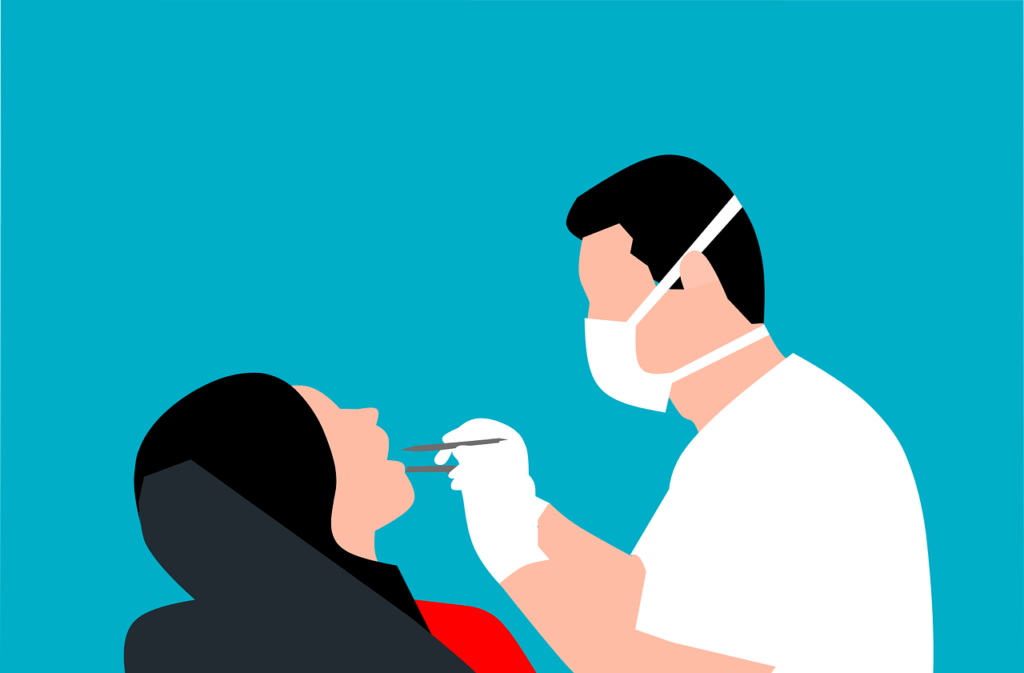Discovering that you have a loose tooth can be both alarming and uncomfortable. It often signals a problem with your dental health that needs addressing. However, there are times when you may be able to manage minor issues with home remedies for a loose tooth.
While some circumstances might require the immediate attention of a dental professional, understanding a range of home remedies can provide first-aid relief and potentially fortify your teeth and gums against further instability.

Loose teeth in adults are usually a sign of underlying dental issues, such as gum disease, which can be influenced by factors like oral hygiene habits and nutritional choices.
Implementing home remedies, such as maintaining proper oral hygiene and incorporating certain foods or homemade solutions, can be an effective avenue for alleviating discomfort and promoting dental health.
Although these remedies can be helpful, the focus should be on prevention and the consistent care of your teeth to avoid the serious complications that a loose tooth could signify.
Key Takeaways
- Managing a loose tooth at home can provide relief and support oral health.
- Proper oral hygiene is essential for the stability of teeth and gums.
- Professional dental care is crucial if loose teeth are accompanied by severe discomfort or other symptoms.
- Proper dental care is essential in preventing tooth loss.
- One common cause of a loose adult tooth is injury.
Understanding Loose Teeth
When you notice your tooth feeling a bit wobbly, it could make you worried. Let’s look at the causes and understand a little more about what’s going on in your mouth.
Sometimes, gum disease is the culprit. It’s a sneaky issue where your gums get inflamed, often due to plaque buildup. You might know it as periodontitis when it gets severe. If your gums look red and feel tender, that could be a sign.
Tooth decay can also lead to loose teeth. It’s like a gradual attack on your tooth, and before you know it, it’s not as solid as it used to be. The thing is, if you’re hitting a bit of a rough patch with your oral hygiene, bacteria can go to town and cause an infection.
Your lifestyle matters, too. If you’re someone who clutches a sugar-packed soda all the time, well, that’s a tooth-decay invitation. And, let’s not forget about conditions like osteoporosis, which weakens the bones, including the ones holding your teeth in place.
But hey, life changes like pregnancy can shake things up too, throwing in hormonal changes that affect your teeth and gums. Plus, if you’ve got diabetes, it can mess with your mouth’s health, leaving you more prone to gum disease.
If you’re facing any of these issues, a chat with your dentist is a must. They’re the go-to pros to help you sort this out and save that smile of yours.
Promoting Dental Health at Home
Maintaining a strong, healthy smile involves more than just visiting your dentist regularly. By adopting certain home practices, you can significantly improve your oral health and potentially stabilize a loose tooth.
Daily Oral Hygiene Practices
Good dental health starts with daily oral hygiene. Ensure you’re brushing twice a day with fluoride toothpaste to fight off plaque. Flossing once daily helps remove particles that your toothbrush can’t reach, protecting against tartar build-up and lowering the risk of gum disease.
Dietary Considerations for Strong Teeth
Your teeth need the right nutrients to stay strong. A diet rich in calcium and vitamin D is crucial for maintaining healthy teeth. Incorporate dairy, leafy greens, and fish into your meals to give your teeth the support they need.
Natural Remedies to Strengthen Teeth
Several natural remedies may help reinforce tooth stability. Rinsing with salt water can ease swollen gums and reduce bacteria. Applying clove oil for pain, using turmeric paste for inflammation, or chewing on garlic are also popular methods to support dental health.
Addressing Gum Health
Healthy gums are the foundation of healthy teeth. Should you notice gum recession or bleeding gums, a saltwater rinse can be beneficial. Hydrogen peroxide diluted in water is another option to reduce harmful bacteria and help heal your gums.
Stress Reduction Techniques
Stress can lead to teeth grinding or clenching, known as bruxism, which might contribute to loose teeth. Try relaxation techniques or consider wearing a night guard to protect your teeth while you sleep.
First-Aid for Loose Tooth Discomfort
When a tooth feels loose, it can cause significant discomfort and anxiety. Fortunately, there are simple first-aid steps you can take at home to manage pain and stabilize the tooth temporarily until you can see your dentist.
Pain Management Options
Dealing with toothache can be tough, but over-the-counter pain relievers like acetaminophen or ibuprofen are effective at reducing pain. Aspirin is another option, but it’s important not to place it directly against the gums as it can cause irritation. For immediate relief, gently applying a cold compress or an ice pack outside of your mouth can help numb the area and reduce pain.
- Acetaminophen or ibuprofen: Take as directed on the package.
- Ice or cold compress: Apply for 20 minutes on, then 20 minutes off.
Temporary Stabilization Methods
To help stabilize a loose tooth, a mouth guard can be worn, especially during sleep, to prevent further movement and damage. This will not fix the tooth, but it can offer protection and reduce the feeling of looseness as you await a dental appointment.
- Mouth guard: Wear while sleeping or during the day if necessary.
Reducing Inflammation and Infection
Combat inflammation by rinsing your mouth with a warm saltwater rinse, which has natural antibacterial properties. If you suspect an infection, a diluted hydrogen peroxide rinse can serve as an antiseptic. However, these measures are temporary and if symptoms persist, you should consult your dentist, as antibiotics may be required to tackle any underlying bacterial infection.
- Saltwater rinse: Mix 1/2 teaspoon of salt with a glass of warm water; rinse several times a day.
- Hydrogen peroxide rinse: Mix equal parts hydrogen peroxide and water; rinse, but don’t swallow.
Remember, while these methods can provide temporary relief, regular dental checkups are crucial to maintaining your oral health, and professional guidance should be sought for loose teeth.
When to Seek Professional Dental Care

Even though you might hope that a loose tooth can be stabilized with home remedies, it’s important to know when to hand the reins over to a professional. If your loose tooth is the result of trauma or comes with severe symptoms, a dentist’s expertise is non-negotiable for ensuring your dental health isn’t at risk.
Indicators for Dentist Visits
When it comes to loose teeth, certain signals should prompt you to make that dentist appointment:
- Persistent Tooth Mobility: If your tooth remains loose after a few days, it’s time for an expert evaluation.
- Gum Disease Symptoms: Look out for red, swollen, or bleeding gums, which may indicate periodontal disease.
- Pain and Discomfort: Don’t tough it out if there’s ongoing jaw pain, toothache, or you notice pus – these are signs your body is fighting an infection.
- Teeth Falling Out: A tooth that’s actually falling out is no DIY situation, you definitely need professional care.
Potential Dental Treatments
So, you’ve made the right call and visited a dentist. Here’s what might be on the cards for you:
- Scaling and Root Planing: Deep clean your way out of trouble with procedures designed to remove tartar and smooth the tooth root.
- Flap Surgery: For more severe cases of gum disease, this treatment helps by cleaning the roots and repairing bone damage.
- Grafts: If bone or gum tissue is lost, grafts can encourage healing and regeneration.
- Dental Implant or Bridge: When a tooth can’t be saved, these are some options to restore your smile and bite.
Prevention Strategies
Keeping your teeth snug and healthy is all about adopting the right dental habits and steering clear of the troublemakers that lead to wobbly pearly whites. Nail the prevention game and you can wave goodbye to concerns about loose teeth—let’s break down how.
Regular Dental Maintenance
Your teeth are counting on you for proper oral hygiene. It’s like a ritual: brushing at least twice a day and flossing once to kick plaque and tartar to the curb. It’s vital to keep up with regular dental checkups—aim for a visit to your dentist every six months to nip any potential gum disease in the bud. Remember, it’s all about catching issues early before they become major problems.
Avoiding Harmful Habits
You’ve got to ditch the bad boys that wreak havoc on your dental health. Topping the list is smoking, a major contributor to gum disease and poor dental hygiene. And if you find yourself clenching or grinding your teeth, seek solutions right away, as these habits can seriously undermine your chompers’ foundation.
Encouraging Children’s Dental Health
Early on, instill good dental hygiene habits in your children. A kid-friendly toothbrush and fun-flavored toothpaste can make brushing almost as exciting as recess. Get them into the habit of regular flossing too, and make sure they understand that a happy, healthy mouth leads to a brilliant smile for years to come.
Supplements and Vitamins for Dental Health
Calcium is like the building blocks for your teeth, providing essential strength and structure. You find it in dairy products, but if you’re not getting enough, consider taking a calcium supplement to keep your teeth firm and healthy.
Vitamin D plays a crucial buddy role for calcium; it helps your body better absorb the calcium you take in. Without it, all that calcium might just go to waste. Get your fix from the sun or through a vitamin D supplement — your teeth will thank you.
For the offensive line against mouth nasties, antibacterial properties in supplements are your MVP. They help fend off the bacteria that causes gum disease and loosens your chompers. Products with natural antibacterial ingredients might give your oral hygiene routine a powerful boost.
Alright, think of regeneration as your mouth’s superhero power — it’s the process by which cells renew to maintain healthy tissues. Vitamins A and C are big on this, supporting gum health and the healing of mouth tissues. You could amp up on these vitamins through diet or if you’re lagging, supplements are always there to back you up.
Here’s a quick rundown:
- Calcium Supplement: Gives teeth their hardness. Aim for 1000-1300 mg/day, depending on your life stage.
- Vitamin D Supplement: Assists in calcium absorption and use. Approximately 600 IU/day is the sweet spot for most.
- Antibacterial Supplements: Look for natural components like tea tree oil for that plaque-fighting prowess.
- Vitamins for Regeneration: Vitamins A and C are your go-tos for maintaining the vitality of your gums and oral tissues.
Taking care of your teeth is more than just brushing and flossing. Giving your body the right nutrients can be a game changer for your smile game. Just remember, these are just boosts, not replacements for good oral hygiene and regular dentist visits!
Exploring Alternative Dental Care
When considering the health of your teeth, sometimes you might want to go beyond brushing and flossing. Here, we’ll look at herbal remedies and holistic approaches that can support oral health, explore cutting-edge research on dental regeneration, highlight the benefits of a healthy lifestyle, and delve into how acupressure can relieve jaw pain.
Herbal Remedies
Herbs like clove and peppermint oil not only provide a burst of freshness but also come with strong antibacterial and anti-inflammatory properties. These can be beneficial in managing gum health and can offer relief when dealing with a loose tooth. Try applying a small amount of clove oil directly to the affected area or rinsing with diluted peppermint oil to keep your oral hygiene top-notch.
Holistic Approaches to Oral Health
A holistic view on oral health considers your entire well-being. Focusing on gum health to prevent gum disease, this can involve alternative medicine strategies that incorporate natural remedies as part of a broader treatment plan. Diet and stress management are also key factors in maintaining a healthy mouth.
New Research on Dental Regeneration
Cutting-edge studies are shedding light on the possibility of dental regeneration. Scientific inquiry is revealing how certain medications and natural remedies might one day reverse bone loss and enhance dental health. It’s an exciting time to follow this research and see how it could revolutionize treatments for dental conditions.
The Role of a Healthy Lifestyle
A healthy lifestyle goes a long way in supporting your teeth. A balanced diet rich in vitamins and minerals can help prevent gum recession and promote overall dental health. Don’t forget that regular exercise and managing stress can also reduce the risk of developing oral health issues.
Acupressure and Massage for Jaw Pain
If you’re experiencing jaw pain, acupressure points on your hand might provide relief. Traditional practices suggest that applying gentle pressure to specific areas can reduce discomfort. Additionally, self-massage techniques may help alleviate tension in the jaw area as part of complementary therapies for oral health.
Frequently Asked Questions
Dealing with a loose tooth can be worrisome, but you’ve got home treatment options that might help. From natural remedies to simple hygiene tweaks, these are some of the most common questions asked.
How can I deal with a loose tooth at home?
At home, maintaining good oral hygiene is crucial. Brush gently with a soft-bristled toothbrush and floss carefully to avoid further trauma. This approach is essential for preventing additional damage or infection.
What’s a quick way to tighten a loose tooth?
While there’s no instant fix, rinsing with salt water can improve oral health and may tighten a loose tooth indirectly. It’s not an overnight solution, but consistent practice can lead to noticeable results over time.
Are there natural methods to strengthen my gums around a loose tooth?
Yes, vitamin C-rich foods like oranges and broccoli can bolster gum health. Also, using a saltwater rinse can reduce inflammation and promote healing, thus possibly strengthening the gums around a loose tooth.
What remedy works best for alleviating the pain of a loose tooth?
To alleviate pain, you can try clove oil for its numbing properties. Apply a small amount to a cotton ball and dab gently onto the affected tooth and gums.
Is it possible for salt water to help with loose teeth?
Rinsing with salt water is known to reduce inflammation and kill bacteria that could lead to worsening oral health. It can be helpful as part of your daily oral care routine if you have a loose tooth.
Can a loose tooth naturally firm up again?
A mildly loose tooth can firm up again as long as the cause of the looseness is addressed and if there’s no severe damage to the tooth or surrounding tissues. However, it’s important to consult your dentist to understand the best course of action.

